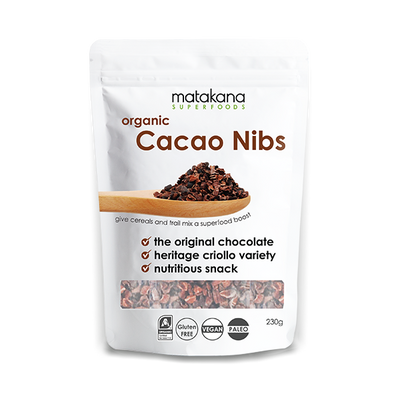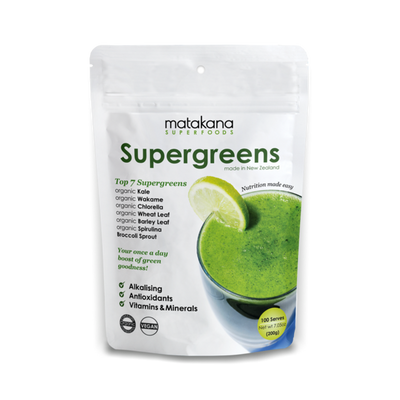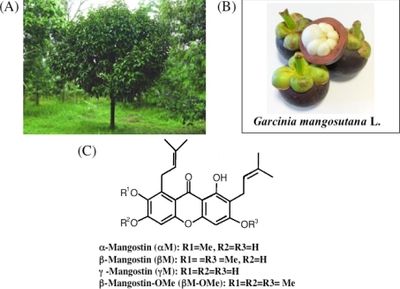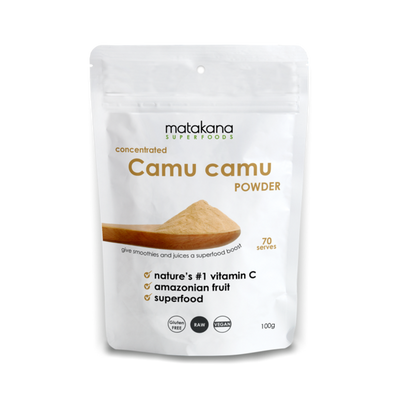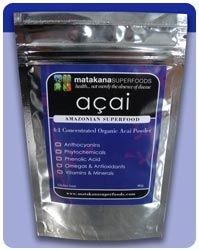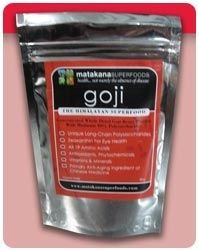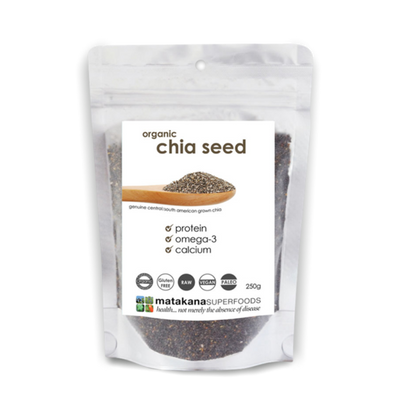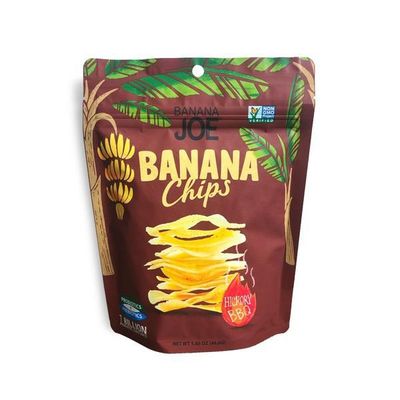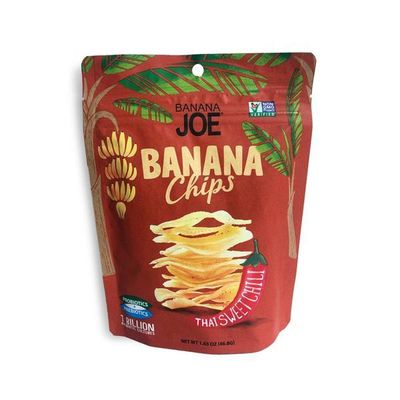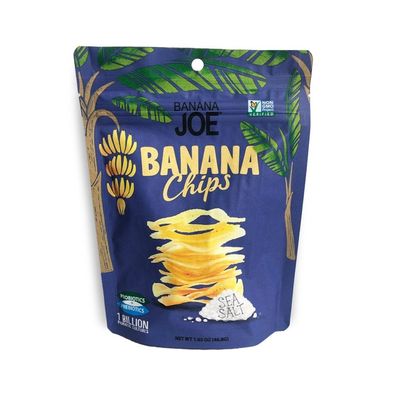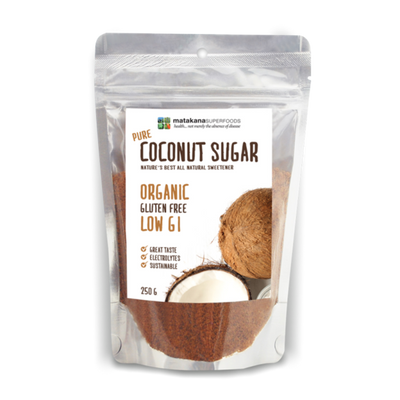
Matakana Pure Coconut Sugar 250g pouch, Great Taste - NO GUILT
Matakana
$9.95
Sustainably harvested from organically grown coconut trees, our Pure Organic Coconut Sugar is minimally processed to retain all of its natural coco-nutty goodness. Its delicious, sweet, caramel flavour makes it a great alternative to regular cane sugar and the perfect addition to your coffee, tea, baking and cooking. No additives, bleaching agents, or chemicals are needed to make coconut sugar and its low G.I (35) makes it a smarter choice for the whole family.Note: It is culturally acceptable in South East Asia for some manufacturers to mix coconut sugar with regular cane sugar and malt, and market it as "palm sugar" or "coconut palm sugar". If you would like to take advantage of coconut sugar's health benefits, read the label and make sure that it is made from 100% pure coconut sugar.
Vitamins & Minerals
Low GI
Electrolytes
Our Pure Organic Coconut Sugar is minimally processed which means that it retains a large quantity of nutrients compared to other more refined sugars which are nutritionally void. Pure coconut sugar contains nature’s vitamins, minerals, amino acids and electrolytes – everything you need to grow a perfect coconut. Although coconut sugar still technically contains a percentage of base sugars sucrose, glucose and fructose, its inulin fibre content and other micronutrients make it act more like an intrinsic sugar (such as that which occurs naturally in a piece of fruit) and therefore has a low GI score of around 35. We consider coconut sugar to be one of the healthiest sugar options available.Sports Performance/Electrolyte ContentOur Pure Ogranic Coconut Sugar is a rich source of electrolytes readily available to re-energize your body when it is under the stress of intense competition. Recharge with convenient coconut sugar sachets and a glass of water at half-time to rehydrate and boost energy levels naturally without the unwanted artificial colourings, additives and poor-performing refined sugars found in most commercial sports drinks.Low GI RatingCoconut sugar is naturally low on the Glycemic Index (GI), and along with a balanced diet, calorie control and exercise, has benefits for weight control and improving glucose and lipid levels in people with diabetes. Coconut sugar has a GI rating of around 35. By comparison agave has a GI of 42, honey 55 and cane sugars 68. The major component of coconut sugar is sucrose (70-79%) followed by glucose and fructose (3-9%) each. Minor batch to batch variations will occur, due to differences in primary processing, raw material source, tree age and variety of coconut.
Use in the same 1:1 ratio as regular sugar.
STORAGE
Store in a cool, dry place.
What is Coconut Sugar?
Coconut sugar is a natural sugar derived from the flowers of the coconut trees (cocos nucifera). It is also not highly processed as no additives, bleaching agents, or any chemicals are needed to make it. In fact, the only processing that takes place is heating the coconut sap to evaporate its water content. It is also considered to be healthier compared to other natural and artificial sugar substitutes. It has a low glycemic index and is more nutritious than typical granulated sugar. Although new to the western world, it has been around and been used as a traditional sweetener for generations particularly in South East Asian countries where the coconut tree grows in abundance.
It is not palm sugar- some palm sugars are derived from palmyra as well as other varieties of palm family. Coconut sugar specifically comes from the coconut tree (cocos nucifera). To put it another way, coconut sugar is a palm sugar but NOT all palm sugars are coconut sugar. This is a very important distinction as other palm sugars do not have the same health benefits or low G.I index as coconut sugar. Some manufacturers mix coconut sugar with regular cane sugar, malt and market it as "palm sugar". If you would like to take advantage of coconut sugar's health benefits, read the label and make sure that it is made from 100% coconut palm/coconut flower sap.
Coconut sugar's taste is reminiscent of brown sugar but with a slight hint of caramel. It can be used as a 1:1 sugar substitute. You can use it for your coffee, tea, baking and cooking! Coconut sugar is quickly gaining popularity as a viable sugar substitute with people who want watch their calorie and sugar intake.
Amino Acid Content
Coconut sugar is made from 100% coconut sap and coconut sap is rich in amino acids. Coconut sap contains 16 amino acids. Amino acids are essential to human metabolism and overall good health. Sixteen (16) out of the 20 amino acids needed to build the values proteins used in growth, repair and maintenance of body tissues, enzymes, and hormones are present in the coconut sap.
The highest amount of amino acid found in the coconut sap is glutamine. Glutamine has been studied extensively over the past 10-15 years and has been shown to be useful in support of , injury, trauma, burns, as well as in wound healing for post-operative patients. It is known to reduce healing time after operations. It is essential for the body to perform it’s natural healing process in states of illness or injury.
Amino Acid Content of Coconut Sugar
Amino Acid Value (g/100g)
Trytophan 1.27
Lysine 0.32
Histidine 1.19
Arginine 0.35
Aspartic Acid 11.22
Threonine 15.36
Serine 8.24
Glutamic Acid 34.20
Proline 3.52
Glycine 0.47
Alanine 2.56
Valine 2.1
Methionine -
Isoleucine 0.38
Leucine 0.48
Tyrosine 0.31
Phenylalanine 0.78
Vitamin Content
Coconut sugar is made from 100% coconut sap and coconut sap is rich in vitamins. It contains various vitamins, including twelve (12) of the essential vitamin B complex. Benefits of B vitamins include:
Inositol, sometimes referred to as vitamin B8, is high in coconut sugar. Inositol is required by the body for the formation of healthy cells. A lack of Inositol may lead to depression, anxiety, OCD and other psychological disorders that respond to serotonin uptake inhibitors
Vitamin Content of Coconut Sugar
Vitamin Value (mg/dl)
Thiamine 77.00
Riboflavin 12.20
Pyridoxine
Paraaminobenzoic Acid 38.70-47.10
Pyridoxal 38.40
Pantothenic Acid 5.20
Nicotinic Acid 40.60
Biotin 0.17
Folic Acid 0.24
Inositol 127.70
Choline 9.00
Vitamin B12 trace
Q. Is Coconut Sugar sustainable?
There are several factors that support Coconut sugar as one of the most sustainable sugar sources:
Coconut trees can grow in severely compromised soil and needs very little water to produce the sweet nectar that is used to make coconut sugar.
Coconuts produce inflorescences about every 3-4 months. What this means is that there are usually multiple flower stalks on a single tree which in turn means that a coconut farmer can actually choose to harvest sugar from one flower stalk and let the other stalk mature to coconuts.
Once a coconut tree is tapped, the sap will flow continuously for the next 20 years. This roughly equates to about 5,000 liters per hectare. From a sustainability standpoint, this is about 5-7 times higher per hectare that coconut oil production.
The Coconut tree is an ecologically beneficial tree crop that grows in diverse, wild-life supportive agro-ecosystems.
Coconut Palms are considered the “Tree of Life” by many traditional communities throughout the world as they provide over 100 smallholder accessible products from which to make livelihoods. The production of Coconut Sugar has the single highest potential for lifting these farmers into a better life while creating a net benefit to their surrounding environment.
Coconut palm Sugar is naturally low on the Glycemic Index (GI), which has benefits for weight control and improving glucose and lipid levels in people with diabetes (type 1 and type 2). Coconut palm sugars are rated as a GI 35. By comparison, most commercial Agaves are GI 42, Honeys are GI 55 and Cane Sugars are GI 68.
The major component of coconut sugar is sucrose (70-79%) followed by glucose and fructose (3-9%) each. Minor variations will occur, due to differences in primary processing, raw material source, tree age and variety of coconut.
Coconut palm nectar has a nutritional content far richer than all other commercially available sweeteners. It is especially high in Potassium, Magnesium, Zinc and Iron (similar to coconut water) and is a natural source of the vitamins B1, B2, B3, B6 and C. It’s also very rich in other minerals and enzymes which aid in the slow absorption into the bloodstream.
GLYCEMIC INDEX EXPLAINED
Coconut palm sugar is GI-35. The Philippine Food and Nutrition Research Institute used the following procedure to determine the Glycemix Index (GI) value of palm sugar:
Fifty grams (240 ml) standard glucose tolerance test beverage (Medic Orange 50, Product no. 089) and fifty (50) grams of coconut palm (Cocos nucifera) sugar was fed in random order to ten (10) human subjects.
Blood samples (0.3-0.4 ml) were collected after feeding through finger prick using a 7ml Vacutainer at zero (0) hour, and thereafter at every 15 min interval for 1 hour, and every 30 min or the next hour.
The serum was separated from the blood using a refrigerated Effendorf centrifuge, and analyzed for glucose levels on the same day using a Clinical Chemistry Analyzer after calibration with the glucose standard (Glucofix Reagent1: Menarini Diagnostics, Firenze, Italy).
The blood sugar levels of the ten (10) healthy human subjects given coconut sugar and reference glucose food samples were graphed against the time of study. The incremental area under the glucose response curve (IAUC) of the coconut sugar was calculated geometrically ignoring the area below the fasting level (Wolever et al.,1991). The Glycemic Index (GI) of the coconut palm sugar was calculated as GI = IAUC of the test food / IAUC of standard glucose multiplied by 100. It’s index value is 35.
Glycemic Index and Glycemic Load:
Glycemic Index takes into account the quality of the carbohydrate in a food and ignores its quantity. A glycemic index value therefore tells us only how rapidly a particular carbohydrate turns into sugar. It doesn’t tell how much of that carbohydrate is in a serving of a particular food. Both the things are important to understand a food’s effect on blood sugar.
Glycemic load considers the quality and the quantity of carbohydrate content of the foods.
The following table gives a values for low, medium and high glycemic load for foods.
Low GI = 55 or less
Medium GI = 56 - 69
High GI = 70 or more
*Values are with reference to Glucose.
Foods that have a low glycemic index invariably have a low glycemic load, while foods with an intermediate or high glycemic index range from very low to very high glycemic load. Therefore, you can reduce the glycemic load of your diet by limiting foods that have both a high glycemic index and a high carbohydrate content.
According to Dr. Trinidad, a scientist from the Food and Nutrition Research Institute - Department of Science and Technology the Glycemic Index (GI) is the glucose response of an individual from food relative to a standard glucose solution. Low G I food is good for proper control and management of diabetes mellitus (type II diabetes) and has been shown to lower total and LDL cholesterol. It is also good for weight maintenance therefore prevents overweight and obesity.
Their findings indicate the glycemic index of 35 for pure coconut sugar
The glycemic index value alone does not give accurate picture of the food. The glycemic load (GL) takes both the things into account. The glycemic load is the glycemic index divided by 100 multiplied by its available carbohydrate content
The glycemic load of coconut palm sugar is 1.4, or 1 when rounded off.
Who can Benefit from Eating Food Low on the Glycemic Index?
